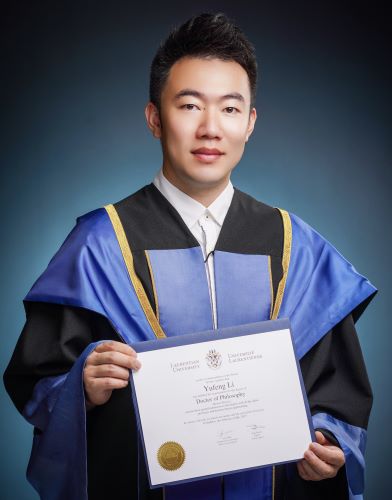
In areas such as renewable energy, electric vehicles and high-speed rail, Canada stands to learn much from the People’s Republic of China.
In the sporting realm, the Asian powerhouse still shows the way in diving, badminton and table tennis, among other pursuits.
But when it comes to the study of Sport Psychology, Yufeng Li suggests that the tables are turned. As a former national caliber table tennis player who has recently completed his PhD studies with Dr Robert Schinke at Laurentian University in Sudbury, Li should know.
“Sport psychology is under-developed in China,” noted the 31 year-old who is now returning to home to put his learnings into very practical usage, teaching at a university in Shanghai and coaching some of the top young table tennis talent in his country.
“There are something like 500 universities in China and only one or two of them offer a Sports Psychology major. For a long time, China focused only on the physical skills and ignored the psychology aspect.”
In a land that bears some similarities but many a difference when it comes to the template of elite youth sports development, Yufeng Li is both researcher and subject. A glimpse into the very foundation of his athletic journey finds the highly introspective young man guiding this reporter along, citing analogies that many a Sudbury parent can relate to.
“In China, table tennis is like ice hockey in Canada,” he said. “It’s very competitive. If you want to pursue a professional career, you have to start from an early age – so I focused only on table tennis.”
In these parts, we might lament the exodus of young hockey talent to Southern Ontario just as their high-school years begin. For his part, Yufeng Li would move, along with his mother, at the age of just five or six, transported some 2000 kilometres from his hometown in order to attend a sports school in Shanghai.
It wasn’t long before the young man realized that his ability to deal with stress, or more accurately his lack of ability to deal with stress would prove problematic.
“I felt a lot of pressure with my mom quitting her job and providing a lot of financial support,” said Li. That said, he made it clear that these feelings were far more internally driven, his parents reiterating many times over their simple desire that he try his very best.
Thankfully, blessed with a well-schooled family lineage, Li’s parents also stressed academics, a value that would eventually lead him to the study of Sports Psychology. It was a very relatable search for knowledge, one that stemmed from his own experiences.
“I had some skills to compete with national level athletes, but every time I would go to the competition, I would feel the pressure and I could not even reach the level of skill that I knew I had,” said Li.
In fact, once he officially retired from elite table tennis competition, Li found that he enjoyed far more success, despite spending far less time practicing his sport. “It made me very interested in understanding how psychological characteristics influence young athletes and performance.”
For the answers, Li and his countrymates would look to the west.
As China began to open their doors to the world on so many levels, the ability to tap into experts in a field that was still quite new to them was critical.
Keep in mind that in Sudbury alone, the study of sport psychology dates back to the work that Dr Wendy Jerome was doing at Laurentian University in the seventies and eighties, the wife of former Olympic bronze medal winner Harry Jerome finding herself at the cutting edge of a burgeoning field of study at the time.
Fast forward forty years or more and Yufeng Li enjoyed some clear-cut advantages in his native land, a country where a large number of the very best athletes achieve sporting success at the cost of a well-balanced life. Sport is their life.
“In China, most athletes have just one identity: as an athlete,” said Li.
“Most professional athletes in China do not have opportunities when they retire. They don’t learn English, they don’t learn school skills and knowledge."
"One of the reasons why Sports Psychology is not huge in China is that the majority of the athletes do not have the knowledge of the studies or academic areas. “The majority of our sport psychologists know this area but without any professional sport experience. There is a huge gap between scientific knowledge and practical experience.”
That is not at all the case in North America.
The ability to study under Dr Schinke spoke to Yufeng Li – but so too did the inherent freedoms that are accepted as the norm in our academic circles in this part of the world.
“In Canada, when you pursue a PhD, you do not have a huge pressure to publish a paper that follows your supervisor’s research,” Li explained. “You can study something that you are more interested in.”
That is not the case in his homeland, where PhD students are steered aggressively to pursue research that very much aligns with the interests of the professor who is overseeing their thesis.
And so he returns home, having gleaned a great deal – and now able to share.
“Because my research speaks to an athlete’s whole career and development, I think I can influence the next generation of (Chinese) athletes,” said Li. “They need scientific training, mental skills training, psychology training.”
“We need the athlete to be a whole person.”







